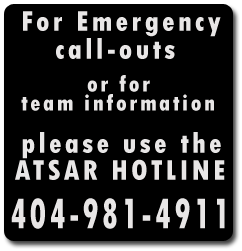Alpha Team posts information on training events via our email list a few days before the training event. Our training events are almost always the first and third Saturdays of each month unless the team is engaged in a search callout. If you are interested in attending training, please contact our Field Support Coordinator and consider the following.
What Gear Should I Bring?
- Dress appropriately. Consider the weather and the forecast for the area where we are training and layer accordingly. It will probably be hotter, colder, or wetter than you expect. Be prepared to deal with that.
- Wear a hat. Hats keep the sun out of your eyes, bugs off your head and out of most of your hair, and they provide an easy way to retain more heat when it’s cold.
- Bring some old leather work gloves. Our dogs are not aggressive and will not bite you but you might get an accidental nip when they’re playing with their reward toy after they find you.
- Bring bug spray and use it. Chiggers and ticks are not fun to deal with. Ask any team member if you need proof and we’ll show you the scars. Some people use DEET-based sprays, some use Picaridin-based sprays, others use home remedies… whatever you choose, use it and reapply as needed.
- Bring sunscreen and use it as needed.
- Bring snacks and water so you’ll have something to eat and drink while in the woods. Hydration is mandatory.
- Bring a compass if you have it. If you don’t have one, you really should get one, even if it’s just a basic North, South, East, West compass. This will help you understand where you are in relation to the maps we use and where prominent landmarks are while walking through the woods.
- Bring rain gear or a poncho or even a large contractor’s trash bag to wear if it rains. Also bring something waterproof to sit or lay on while you are waiting for the dog team to find you. Contractor’s garbage bags are a cheap and compact solution for this. Stay dry to keep from incurring hypothermia.
- Bring a book or magazine to read.
- Bring a ham radio (if licensed) or FRS radio, if you have one.
- For night training events, bring a flashlight (or two) and spare batteries. Make sure your flashlights work well before coming to the event. Stumbling through the woods in the dark is not recommended.
What Shouldn’t I Do or Bring?
- Do not just “show up” at training. Make sure we know you are coming so we can plan accordingly.
- Don’t bring your dog to our training event unless you have specifically cleared it with our President.
- Don’t wear shorts or any kind of open-toed shoes. Boots are best but a good pair of tennis shoes will do until you get some boots.
- Don’t assume it won’t rain — it will. Be prepared for it.
- Don’t assume team members will give you rain gear, food, water, etc. if you didn’t bring it. (FYI… we probably will because that’s just how we are but please don’t count on it).
- Don’t bring an iPod or other media player; it may hamper your ability to hear the dog teams searching for you.
- Don’t wear strong perfumes; bugs seem to be more attracted to sweet smells.
- Don’t think you’ll offend someone by picking off a tick they can’t see. Please pick them off and destroy them; we hate those suckers.
- Don’t assume everything will go exactly as you expect — it won’t.
What Else Should I Consider?
- This is not a fashion show; no one will criticize you for whatever blend of clothing you put together.We dress for comfort and utility and so should you.
- Be at the rally location 15 minutes before the scheduled start time. SAR organizations have an unwritten rule that being on-time is late and being 15 minutes early is on-time.
- As the saying goes, “Cotton kills”. We typically stay away from putting 100% cotton clothing next to our skin. Cotton does not dry quickly and this promotes hypothermia. For training purposes, clothing from companies like Carhartt are ok but they are usually too thick and do not “breathe” well. If you are truly interested in getting involved in search and rescue, look for poly blends like those found in Tru-Spec or 5.11 clothing and layer accordingly.
- Before you go out and spend a ton of money getting SAR gear, make sure that SAR really is something you want to dedicate a lot of time toward. We’ve known a lot of people who ended up selling off all their SAR gear a couple years later because SAR “just wasn’t what they expected”. While this is a great way for us to inexpensively add barely used equipment to our gear boxes, it’s not something we like to see happen. Make sure this “hobby” really is for you before you invest heavily in gear and clothing — it can get expensive really fast.
- Ultimately YOU are responsible for your own safety, health, and well-being. If you don’t feel comfortable with what you’re being asked to participate in, tell someone and we’ll get you involved in something else.
- Be patient and flexible and you’ll fit in just fine.
If you have additional questions, contact our Field Support Coordinator.

